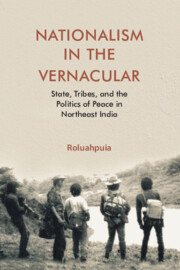Book contents
- Frontmatter
- Dedication
- Contents
- List of Figures
- Preface
- Acknowledgements
- List of Abbreviations
- Notes on Transliteration and Translation
- 1 Introduction
- 2 The ‘Tribal Question’ in India: Problem of Inclusion
- 3 The Emergence of Mizo Nationalism: The Formative Phase
- 4 The Mizo National Front and the Vernacularization of Nationalism
- 5 Violence, Counter-Insurgency, and the Transcript of Resistance
- 6 Discord, Accord, and the Politics for Peace
- 7 Conclusion
- Glossary
- References
- Index
4 - The Mizo National Front and the Vernacularization of Nationalism
Published online by Cambridge University Press: 30 April 2023
- Frontmatter
- Dedication
- Contents
- List of Figures
- Preface
- Acknowledgements
- List of Abbreviations
- Notes on Transliteration and Translation
- 1 Introduction
- 2 The ‘Tribal Question’ in India: Problem of Inclusion
- 3 The Emergence of Mizo Nationalism: The Formative Phase
- 4 The Mizo National Front and the Vernacularization of Nationalism
- 5 Violence, Counter-Insurgency, and the Transcript of Resistance
- 6 Discord, Accord, and the Politics for Peace
- 7 Conclusion
- Glossary
- References
- Index
Summary
In 1962, the MNF organized a choir competition in Aizawl, drawing participants from various local YMA branches. The song ‘Harh La, Harh La’ (Awake, Awake), composed by Rokunga, was chosen as the common song for the competition. It reflected the events of the time when it was composed. Between 1959 and 1961, the Mizo Hills and their adjoining areas were hit by a massive famine known as mautam. The impact of the famine was severe, with massive loss of food grains that led to mass starvation and the deaths of many across the hills. By 1962, the famine was more or less over, and as normal life began to resume, Mizo politics underwent a whirlwind of change. Under the banner of the MNF, a new political formation began to hold sway in Mizo politics rivalling the MU. This reignited debates about the contested ideas splitting the Mizo public on the issue of independence. Around this time, hnam hla took over the political discourse, with many of them harking upon the larger issue of independence.
The chapter focuses on the idea of Mizo nationalism. Scholarly studies on the MNF movement have explored how the Mizos’ struggle for independence was an outgrowth of the injustice meted out to the Mizos during the famine of 1959 by the Assam government (U. Phadnis 1989; Lalchungnunga 1994; S. Nag 2002). The wider strand of studies has used the greed or grievance factor to explain the rise of Mizo nationalism or the insurgency movement. Likewise, a common approach is to situate them within the conflict and security perspective that focuses on relative deprivation and rational choice theories (Gurr 1970; Brenner 2018). For instance, Gurr (1970: 24) notes that ‘the potential for collective violence varies strongly with the intensity and scope of relative deprivation among members of collectivity’. The merit of Gurr's analysis in terms of adopting a relative deprivation approach becomes useful if one uses the ‘famine’ as the precursor for the MNF movement or Mizo nationalism (Nag 2001, 2002; Vadlamannati 2011). However, the blind spot of this approach is the ideas and ideologies of nationalism and the intimate aspect and the highly emotional nature of nationalist movements. While the MNF marked its presence with the famine of 1959, the idea of Mizo nationalism predates the emergence of the MNF.
- Type
- Chapter
- Information
- Nationalism in the VernacularState, Tribes, and Politics of Peace in Northeast India, pp. 81 - 111Publisher: Cambridge University PressPrint publication year: 2023



